Explain possible priori - Study guides, Revision notes & Summaries
Looking for the best study guides, study notes and summaries about Explain possible priori? On this page you'll find 30 study documents about Explain possible priori.
Page 3 out of 30 results
Sort by
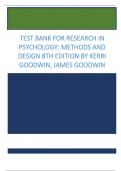
-
TEST BANK FOR RESEARCH IN PSYCHOLOGY METHODS AND DESIGN 8TH EDITION
- Exam (elaborations) • 175 pages • 2021
-
- £15.53
- 12x sold
- + learn more
TEST BANK FOR RESEARCH IN PSYCHOLOGY METHODS AND DESIGN 8TH EDITION Goodwin & Goodwin Multiple Choice 1) What do the preface to Wundt’s Principles of Physiological Psychology and the original constitution of the American Psychological Association have in common? a) they both defined psychology as the study of behavior b) they both recognized that psychology was a subdivision of philosophy c) they both emphasized the scientific nature of the new psychology d) they both defined psychology ...
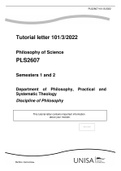
-
PLS2607 - Philosophy Of Science Semesters 1 and 2 3/2022.
- Exam (elaborations) • 38 pages • 2022
- Available in package deal
-
- £2.93
- + learn more
PLS2607 - Philosophy Of Science Semesters 1 and 2 3/2022. 5.3 Electronic Reserves (e-Reserves) The following prescribed journal articles and book chapters are available as e-reserves. You are encouraged to obtain them timeously by visiting the website of the Unisa Library (, under “Search Options”, select “Course Code Search”, and then enter “PLS2607”): 1. Chalmers, A.F. 2013. “Theories as structures I: Kuhn’s paradigms.”, pp. 97-120, in: What is this thing called science...
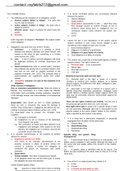
-
OBLICON-QUIZ (INTERNET BASED) (OBLICON REVIEWER)
- Exam (elaborations) • 20 pages • 2023
-
- £8.57
- + learn more
The following are the requisites of an obligation, except: a. Passive subject, debtor or obligor. - The party who has the right to demand. b. Active subject, creditor or oblige. -the party who is obliged to perform. c. Efficient cause. -legal or juridical tie which binds the parties. d. Demand.Test 1 Multiple Choice 1. The following are the requisites of an obligation, except: a. Passive subject, debtor or obligor. - The party who has the right to demand. b. Active subject, creditor or oblige. -...
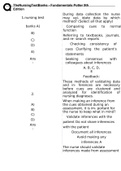
-
Summary (Complete all chapters 1-46 ,Answered with rationales) TEST BANK FOR FUNDAMENTALS OF NURSING 9TH EDITION BY TAYLOR_ 2023.
- Exam (elaborations) • 29 pages • 2023
-
- £10.21
- + learn more
ng test banks A) B) C) D) E) Ans: 2. A) B) C) D) Ans: During data collection the nurse may val- idate data by which method? (Select all that apply) Comparing cues to normal function Referring to textbooks, journals, and re- search reports Checking consistency of cues Clarifying the patient's statements Seeking consensus with colleagues about inferences A, B, C, D, E Feedback: These methods of validating data and in- ferences are necessary before cues are clustered and analyzed for iden...
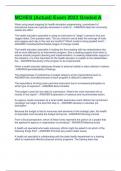
-
MCHES (Actual) Exam 2023 Graded A
- Exam (elaborations) • 11 pages • 2023
-
- £10.62
- + learn more
When using asset mapping for health education programming, commitment of educational resources typically decreases in order to: - ANSWER-Help the community sustain the effort The health education specialist is using an instrument to "stage" a person's fruit and veggie intake. One question asks, "Do you intend to eat at least five servings of fruits and veggies each day in the next six months?" Which model is being applied here? - ANSWER-Transtheoretical Model (stages of change model) ...
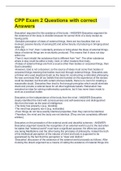
-
CPP Exam 2 Questions with correct Answers
- Exam (elaborations) • 8 pages • 2023
-
- £8.17
- + learn more
Descartes' argument for the existence of the body - ANSWER-Descartes argument for the existence of the body is divisible because he cannot think of a body except as having parts. -Sensible perception of ideas of external things, there are two faculties that a re involved: passive faculty of sensing [P] and active faculty of producing or bringing about ideas [A] -If A stays in "me", then I voluntarily produce or bring about the ideas of external things. Ideas of external things are involunt...
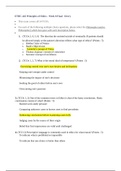
-
ETHC 445 Final Review Questions And Answers Complete Solution Rated A.
- Exam (elaborations) • 14 pages • 2021
-
- £9.06
- + learn more
ETHC-445 Principles of Ethics - Week 8 Final - Devry This exam covers all 14 TCO's. For each of the following multiple choice questions, please select the Philosophy (and/or Philosophe r) which best goes with each description below. 1. (TCOs 2, 4, 5, 6) The idea that the assisted suicide of terminally ill patients should be allowed simply at the patient's direction reflects what type of ethics? (Points : 5) a. Hobbes' State of Nature b. Rand's Objectivism c. Aristotle's conc...
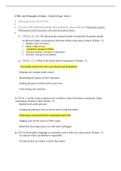
-
ETHC 445 Final Review Questions And Answers Complete Solution Rated A.
- Exam (elaborations) • 14 pages • 2021
-
- £14.30
- + learn more
ETHC-445 Principles of Ethics - Week 8 Final - Devry This exam covers all 14 TCO's. For each of the following multiple choice questions, please select the Philosophy (and/or Philosophe r) which best goes with each description below. 1. (TCOs 2, 4, 5, 6) The idea that the assisted suicide of terminally ill patients should be allowed simply at the patient's direction reflects what type of ethics? (Points : 5) a. Hobbes' State of Nature b. Rand's Objectivism c. Aristotle's conc...
An essay assignment detailing Incidents and emergencies explaining possible priorities and responses when dealing with two particular incidents or emergencies in a health or social care setting
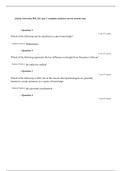
-
Liberty University PHIL 201 quiz 3 complete solutions (Updated 2019)
- Exam (elaborations) • 22 pages • 2019
- Available in package deal
-
- £15.93
- + learn more
(Updated 2019) Liberty University PHIL 201 quiz 3 complete solutions correct answers You will get A grade More than 10 different versions · Question 1 3 out of 3 points Which of the following can be classified as a priori knowledge? · Question 2 3 out of 3 points Which of the following represents the key difference in thought from Descartes to Bacon? · Question 3 3 out of 3 points Which of the following is NOT one of the reasons that epistemologists are generally hesitant to accept...

How did he do that? By selling his revision notes on Stuvia. Try it yourself! Discover all about earning on Stuvia



